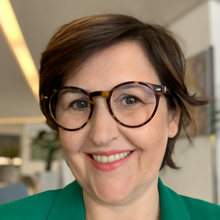Edimara Luciano


Edimara M. Luciano is a Professor in the Management Graduate Program at the Pontifical Catholic University (PUCRS), Porto Alegre, Brazil, and a Guest Professor in the Department for e-Governance and Administration at the University for Continuing Education Krems (UWK), Krems, Austria.
She holds a Master’s and a Ph.D. from the Federal University of Rio Grande do Sul, Brazil. She was a research fellow at the London School of Economics and Political Science, UK (2016), a visiting professor at the University of Stockholm, Sweden (2017) and at the University for Continuing Education Krems, Austria (2019). She heads the Governance and Digital Society Research Group. She was in charge of several administrative positions in the Vice-President Office for Research and Vice-President Office for Management. She was elected for two terms at ANPAD – Brazilian Association of Graduate Programs in Management, from 2014-2016 as a Scientific Committee Member, and from 2021-2023, as the Coordinator of the Information System Division, being a Conference Co-Chair in three editions of the Brazilian Academy of Management (ENANPAD), the leading conference promoted by this association, and ANPAD Information Systems Conference (ENADI). She was a mini-track co-chair at AMCIS from 2013-2019 and is 2023-present, and a track co-chair at ICEGOV since 2021 and at dg.o since 2022. She is conference co-track chair for d.g.o 2024 and 2025. She coordinated and was a team member of several projects funded by Brazilian and international research agencies. She was the local coordinator of the ERASMUS Capacity Building Project CAP4CITY (2018-2023), and the coordinator of a CAPES PRINT Internationalization Mobility Project (2018-2024), CAPES Global South Strategic Cooperation (2019-2024), and Inter-American Development Bank Capacities for Digital Transformation in the Sub-National Level of Brazil. She was a member of an ERASMUS Capacity Building Project Climate Labs and Social Innovation (2019-2023).
Her research interests are Digital Government, Smart and Sustainable Cities, Open Government, Collaborative Governance, Digital Transformation Governance, Public Value, and Social Innovation.
